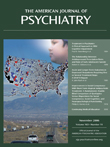In This Issue
Suicide and Antidepressants in Children
A nationwide epidemiologic study indicates that a lower suicide rate among children 5-14 years old is associated with a higher number of prescriptions for selective serotonin reuptake inhibitor (SSRI) antidepressants. For each U.S. county, Gibbons et al. (p. Original article: 1898 ) determined the number of suicides and the number of SSRI prescriptions for residents ages 5-14 during 1996-1998. The association with SSRIs remained after allowance for income and availability of psychiatrists, suggesting that lower suicide rates were not due to better access to health care. This finding appears to differ from the results of randomized, controlled drug trials for children, and Dr. Gregory Simon discusses clinical implications in an editorial on p. Original article: 1861 .

STAR*D: The Big Picture
In the Sequential Treatment Alternatives to Relieve Depression (STAR*D) study, remission was more common among patients in their first or second treatment trial (37% and 31%, respectively) than among those requiring three or four trials (14% and 13%). Rush et al. (p. Original article: 1905 ) also note that the 67% overall remission rate is misleading because many patients left the study after each step. Participants who required more treatment steps tended to have more chronic depression and more coexisting psychiatric and general medical disorders. Among responding patients who entered a follow-up period, relapse was associated with a lack of full remission and a higher number of treatment steps. Dr. Craig Nelson assesses what has been learned from STAR*D results in an editorial on p. 1864.
Antipsychotics Improve Social Skills
In addition to decreasing symptoms and cognitive deficits, antipsychotic medications may increase social competence in patients with schizophrenia. Harvey et al. (p. Original article: 1918 ) report that 289 patients treated with quetiapine or risperidone for 8 weeks showed improvements on the Social Skills Performance Assessment. The treatment-related changes in social competence were correlated with improvements in neuropsychological performance. Lee et al. (p. Original article: 1926 ) found that patients with schizophrenia experienced increases in social functioning and illness-related insight during treatment and that these changes correlated with increased activation in the left medial prefrontal cortex. The functional improvements seen in both studies could have implications for patient disability and associated costs. In an editorial on p. 1867, Dr. Robert Buchanan relates these findings to development of new drugs for schizophrenia.
Religion and Schizophrenia
The benefits of religion for people with schizophrenia are relatively unexplored. In a survey of 115 outpatients with schizophrenia, Mohr et al. (p. Original article: 1952 ) found that religion or spirituality had many positive aspects for them. The respondents reported that these beliefs helped them cope with their illness, reduced symptoms, lessened substance use and suicide attempts, and guided interpersonal behavior. Although some patients felt that there is a contradiction between religion and psychiatric care, some believed that “God has provided psychiatrists and medication to heal patients.”
Better Treatment for Methamphetamine Use
The most effective treatment for methamphetamine use disorders can be made even better by rewarding patients for abstinence. In a 12-week study, Roll et al. (p. Original article: 1993 ) compared treatment as usual with and without escalating prizes for achievement of goals. The patients receiving prizes in addition to treatment as usual had significantly more stimulant-negative urine samples and longer intervals of abstinence. For most patients, usual treatment was Matrix model therapy, a combination of relapse prevention, family and group therapies, drug education, self-help, and drug abuse monitoring. Prize-based contingency management adds operant conditioning, which has previously proven to be helpful in treating cocaine and other substance use disorders. Dr. Stephen Higgins comments on behavioral treatment of methamphetamine abuse in an editorial on p. Original article: 1870 .



